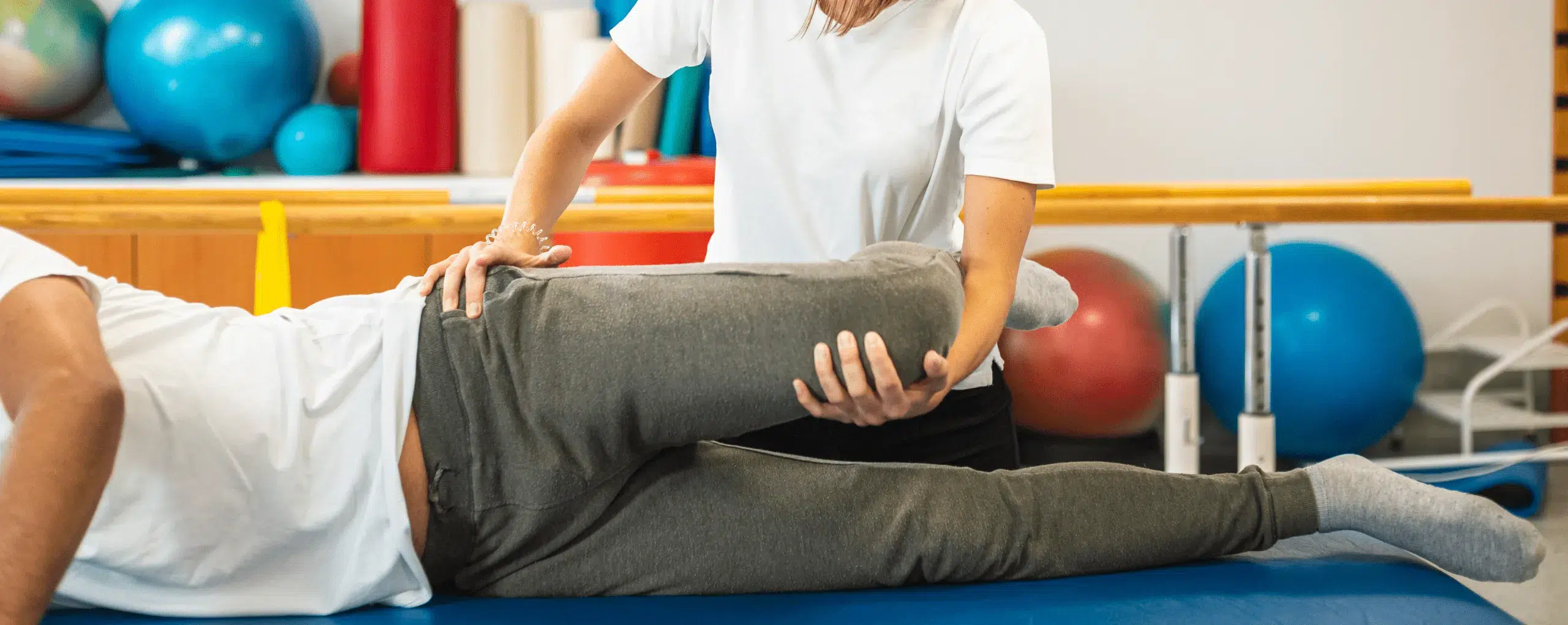Diagnosis and Treatment of Hip Strains in Wake County

Can You Pull a Muscle in Your Hip?
A hip strain is the result of extreme stretching or tearing of a muscle that supports the hip joint. A strained hip can be mild, moderate, or severe; a severe strain can limit your ability to move your hip. There are two large bones that make up the hip joint: the femur, or thighbone, and the pelvis. The hip joint serves as an anchor for several muscles that extend across the abdomen or the buttocks (hip flexors, gluteals) or move down the thigh to the knee (abductors, adductors, quadriceps, hamstrings). When a hip strain occurs, these surrounding muscles and tendons can be injured. Hip strains frequently occur near the point where the muscle joins the connective tissue of the tendon. A strain can be a simple stretch of your tendon or a partial or complete tear of the muscle fibers.

What Causes Hip Strains?
Anyone can experience a hip strain just by performing their everyday tasks, but strains most often occur during sporting activities. Some possible causes of hip strains include:
- An acute injury due to a fall or direct blow to the hip
- Overuse
- Prior injury in the same area
- Muscle tightness
- Failure to warm up properly before exercising
- Doing too much too quickly during exercise or sports
Symptoms of Hip Strains
Being aware of the possible symptoms of a hip strain is crucial to seeking out proper treatment for your injury. If you notice any of the following signs and symptoms, we encourage you to schedule an appointment with a Raleigh Orthopaedic hip specialist today.
- Pain and tenderness in the injured area
- Increased pain when using the muscles
- Swelling
- Muscle weakness
- Limited range of motion
How are Hip Strains Diagnosed?
When diagnosing a hip strain, your healthcare provider will begin by learning your medical history. Information such as when your symptoms began, activities that cause or worsen your symptoms, and the severity of your symptoms can be very beneficial to a doctor trying to determine the cause of your pain. In most cases, a physical examination is all that is needed to diagnose a hip strain. Your doctor will perform range of motion tests to check joint stability and muscle strength. Occasionally, your healthcare provider may order an X-ray or MRI to rule out a more serious injury to the hip.

Treatment Options for Hip Strains at Raleigh Orthopaedic
Typically, treatment for a pulled muscle in the hip is nonsurgical and includes the following methods:
- Rest, Ice, Compression, and Elevation (RICE)
- Activity modification, such as avoiding activities that worsen symptoms
- Non-steroidal anti-inflammatory drugs (NSAIDs) such as ibuprofen or naproxen to help reduce pain and swelling
- Home exercises to strengthen muscles that support the hip
- Physical therapy to increase hip strength and flexibility
- Assistive devices such as crutches for a few days to limit the weight on the hip
- Steroid injection: Injection of a corticosteroid along with a local anesthetic may relieve symptoms temporarily or permanently. If pain returns, another injection may be needed.
Severe injuries in which the muscle fibers are completely torn may require surgery in order to return to normal function and movement. Surgery for a hip strain typically involves stitching the torn pieces back together. However, even in cases of severe strains, nonsurgical methods have proven successful in returning a patient to their normal lifestyle.

Recovering from a Hip Strain
In most cases, you should avoid the activity that caused your injury for 10 to 14 days. A severe muscle strain may require a longer period of recovery. If you feel pain, stop what you are doing and go back to easier activities that do not cause pain. The earlier you receive treatment for your hip strain, the better, as delayed treatment can result in a longer recovery time and future hip problems.
Can Hip Strains Be Prevented?
Most hip strains occur as a result of a sports-related injury. The best way to prevent strains is by warming up and stretching before exercising or playing games. Increasing flexibility will also protect your muscles from injury. The more you work your muscles, the more flexible they are, allowing them to give way when performing specific motions. When your muscles are flexible, muscle fibers have more room to stretch instead of tear. The following precautions can be taken to help prevent muscle strains in the future:
- Condition muscles with exercise
- Warm up before exercise or sports activity
- Wear appropriate protective gear
- Take time to cool down after exercise or sports activity. Instead of performing a large number of rapid stretches, stretch slowly and gradually, holding each stretch to give the muscle time to respond and lengthen.

Comprehensive Hip Care at Raleigh Orthopaedic
Raleigh Orthopaedic is Wake County’s oldest and most experienced orthopedic practice, serving the Triangle and surrounding regions of central North Carolina since 1919. We are proud to give those in and around Wake County convenient access to comprehensive orthopedic care, with treatment options available for a wide range of orthopedic conditions and injuries. Don’t let hip pain limit your daily life and comfort – give us a call today to schedule an appointment with a Raleigh Orthopaedic specialist or book online today. We look forward to hearing from you.









